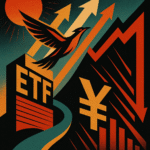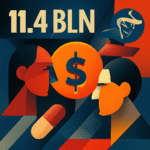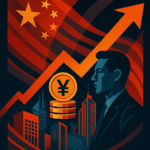Key Points
- Who met: He Lifeng (Hé Lìfēng 何立峰) met with David M. Solomon (Sū Déwēi 苏德巍) in Beijing on November 4, 2025 to advance implementation of the Busan leaders’ consensus.
- Policy signal: The meeting signals a coordinated push to conscientiously implement leaders’ consensuses and to stabilize expectations for enterprises, supporting more predictable China‑U.S. economic ties.
- Market impact: Goldman Sachs (Gāoshèng 高盛) expressed it is optimistic about China’s economic prospects, a positive sign for continued foreign participation in China’s capital markets (underwriting, advisory, trading).
- What to watch: Concrete follow-through from 中央财办 (Office of the Central Financial and Economic Affairs Commission) and visible actions implementing the Busan consensus will determine the real economic and investment outcomes.

Quick summary of the Beijing meeting and what it means for China-U.S. economic relations
China-U.S. economic relations were front and center when He Lifeng (Hé Lìfēng 何立峰) met with David M. Solomon (Sū Déwēi 苏德巍) in Beijing on November 4, 2025.
The meeting focused on implementing recent leaders’ economic consensus reached at the leaders’ summit in Busan, South Korea.
This short briefing keeps every factual detail intact and highlights practical implications for investors, founders, techies, and marketers.
Who met, where, and why it matters
He Lifeng (Hé Lìfēng 何立峰) is a member of the Political Bureau of the Communist Party of China Central Committee and director of the Office of the Central Financial and Economic Affairs Commission (Zhōngyāng Cáibàn 中央财办).
David M. Solomon (Sū Déwēi 苏德巍) is chairman and chief executive officer of Goldman Sachs (Gāoshèng 高盛).
The two met in Beijing on November 4, 2025, to discuss the next phase of bilateral economic and trade relations and implementation of the leaders’ consensus from Busan.
Key statements from the meeting
-
He Lifeng emphasized that the Busan meeting provided clear direction for the next phase of China-U.S. economic and trade relations.
-
He Lifeng said both sides should conscientiously implement the important consensuses reached by the two heads of state to stabilize expectations for enterprises.
-
He Lifeng stated that implementing these consensuses will help promote a stable, healthy, and sustainable development of bilateral economic and trade relations and benefit global economic stability.
-
He Lifeng also welcomed Goldman Sachs (Gāoshèng 高盛) to continue investing and doing business in China.
-
David Solomon said Goldman Sachs is optimistic about China’s economic prospects and intends to keep contributing to the high-quality development of China’s capital markets.
What this signals for markets and investors
This meeting signals a mutual push from Beijing and a leading global investment bank to stabilize bilateral economic ties.
It highlights a deliberate move toward implementing high-level agreements, which can reduce policy uncertainty for companies active in cross-border trade and investment.
From an investor’s perspective, the meeting is a positive signal for continued foreign participation in Chinese capital markets.
For founders and market operators, the message is: Beijing is inviting continued foreign investment, and major financial institutions are publicly reaffirming their commitment.
Practical implications
-
Market confidence: The public nature of the meeting reinforces efforts to stabilize expectations for enterprises on both sides.
-
Capital markets: Goldman Sachs’ stated optimism suggests possible ongoing underwriting, advisory, and trading activity in China’s markets.
-
Cross-border deals: Firms can view this as a signal that Beijing favors continued engagement from major global banks.
-
Global stability: Implementation of consensuses between leaders is framed as beneficial not only for bilateral trade but for broader global economic stability.
How founders and tech investors should think about this
Founders should see an opening to pursue partnerships and funding with international banks that signal continued China engagement.
Tech investors should track policy rollouts that follow these high-level consensuses because implementation details will determine sectoral winners and losers.
Marketers and growth teams should be ready to adjust messaging to reflect increased policy clarity and potential inflows of institutional capital.
What to watch next
-
Follow-up policy announcements from the Office of the Central Financial and Economic Affairs Commission (Zhōngyāng Cáibàn 中央财办).
-
Goldman Sachs (Gāoshèng 高盛) activity in China, including IPOs, advisory deals, and market commentary.
-
Actions that concretely implement the Busan leaders’ consensus, because execution will determine the real economic impact.
Quick takeaways
-
Top-level alignment matters: Leaders’ consensuses set expectations and are now being pushed toward implementation.
-
Global players welcome: Beijing publicly invited continued investment from Goldman Sachs, a signal to other global banks.
-
Market signal: Goldman Sachs’ optimism is a positive sign for China’s capital markets.
-
Investors should watch execution: The difference between rhetoric and implementation will determine near-term outcomes.
Bottom line
He Lifeng (Hé Lìfēng 何立峰) meeting with David M. Solomon (Sū Déwēi 苏德巍) is a concrete, public step toward implementing the Busan leaders’ consensus and stabilizing China-U.S. economic relations.
For investors, founders, and market operators, the meeting is a sign to monitor policy follow-through and financial market participation by global banks.
China-U.S. economic relations continue to be actively managed at the highest levels, and this meeting reinforces that narrative.

Find Top Talent on China's Leading Networks
- Post Across China's Job Sites from $299 / role
- Qualified Applicant Bundles
- One Central Candidate Hub
Your First Job Post Use Checkout Code 'Fresh20'






